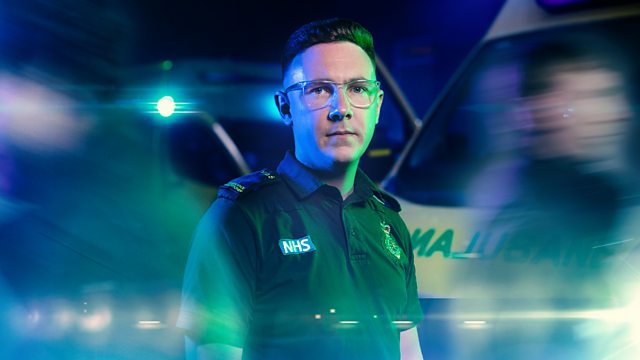
Every second counts as critical care paramedic Zach tries to stabilise an 11-year-old boy who has been seriously injured in a multi-car crash.
With Yorkshire’s Air Ambulance en route to deliver hospital level care at the roadside, critical care paramedic Zach prioritises care for 11-year-old Keean, who has sustained a traumatic head injury and a badly broken leg. After four unsuccessful attempts to fit a cannula to give Keean pain relief, the team resort to an intraosseous infusion, a procedure which involves drilling into the bone marrow of the patient’s leg and is often used in children whose veins are difficult to access. Fortunately, the intervention is a success, and the pain subsides, which means Keean can be transported to Leeds General Infirmary for treatment.
The episode opens with a call from the family of a man who is struggling to breathe. As the first crew arrives, Steven’s condition is deteriorating rapidly, so they request urgent back-up from Leeds-based crew Ryan and Tom. On arrival, they find the patient in a critical state surrounded by family members. Time is of the essence if his life is going to be saved, so the team work to stabilise him before taking him to hospital on blue lights.
As the day shift begins, Ryan and Tom are dispatched to 89-year-old Fred, who has suffered a bout of confusion overnight and collapsed to the floor. Once at the scene, they offer reassurance to his wife Norma before helping him back onto the bed for checks. Concerned he may have sustained a head injury, the crew decide he needs a hospital brain scan. As they assess him, Fred shares stories of his long career as a railway fireman.
Midway through the shift and the ambulance service is under pressure – a new call is coming in every fifteen seconds. Rising demand triggers an escalation of the clinical safety plan to level 3, which means the control team must prioritise ambulances for the sickest patients. But as the surge in demand continues, the plan is raised to the highest level – level 4 – meaning the lower-priority calls will not be sent an emergency ambulance, and instead they are told to make their own way to hospital.
Luke and Regan are dispatched to 91-year-old Molly, who has been waiting nearly an hour after a fall outside a library. Her face is badly bruised, but as the crew begin their assessment, she remains in good spirits, joking about the time she broke both elbows on Christmas Eve many years ago. Luke and Regan find her a delight to care for as they make her as comfortable as possible before taking her to hospital for treatment.
As a new shift begins, the team are hoping for a calmer day than the one they’ve just endured. Call handler Cam is first to answer a call, and he hears a familiar voice on the line. The caller has made more than fifty 999 calls to the ambulance service in just two weeks. Even when there is no genuine emergency, the woman repeatedly rings back, jamming the phone lines. On this occasion, the symptoms she reports automatically trigger a Category 1 response – the highest level reserved for life-threatening situations. Although their previous experience with her makes the team sceptical, protocol means they cannot cancel the ambulance based on suspicion alone, so an emergency ambulance is dispatched.
As the team deal with what turns out to be another false alarm, a genuine emergency comes through – a 10-year-old boy, Dominik, has been hit by a car. Ryan and Tom are immediately dispatched and arrive to a chaotic scene. Dominik, though, is calm, and he can tell them he has pain in his foot and can’t wiggle his toes. Ryan speaks with the driver about what happened and he suspects Dominik’s foot may have been crushed under the car’s tyre. Concern that he may have suffered a fracture, the crew take him to hospital for an x-ray.
Meanwhile, Matt and Rhys meet Jill, who has been living with multiple sclerosis for 31 years and has been waiting for help for over ten hours. Supported by her sister Lindsay, it is clear Jill’s chronic illness has had an impact on the whole family. Lindsay confides Jill’s suffering has been the single biggest heartbreak of her life. As the crew assess Jill’s condition, her loss of movement is a concern, and they advise a trip to hospital.
With the shift drawing to a close, Ryan and Tom are sent to reports of a man who has been found not breathing by council workers. On arrival, they discover the person has in fact been dead for some time. As they survey the scene, Ryan notices a poem on the wall is the same one his grandmother once loved. The words move him, stirring memories of the grandparents who shaped his life. Ryan shares how his close bond with his grandmother inspired his love of poetry, and he is moved to write his own poetic tribute to the work of Yorkshire Ambulance Service.
On TV
More episodes
Previous
Next
You are at the last episode
Credits
| Role | Contributor |
|---|---|
| Narrator | Christopher Eccleston |
| Executive Producer | Simon Ford |
| Executive Producer | James Robinson |
| Executive Producer | Lucy Morgan |
| Series Editor | Tasha McLintock |
| Series Producer | Bruce Turner |
| Production Company | Dragonfly Film and Television |
Broadcast
- Tue 25 Nov 2025 21:00
